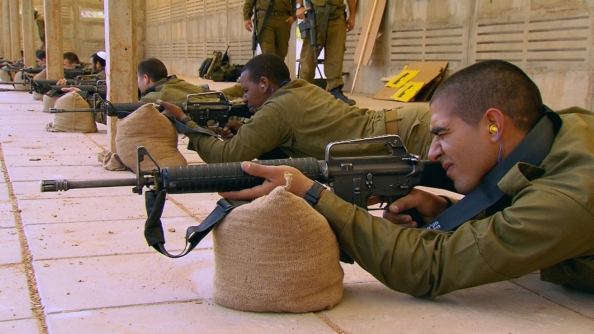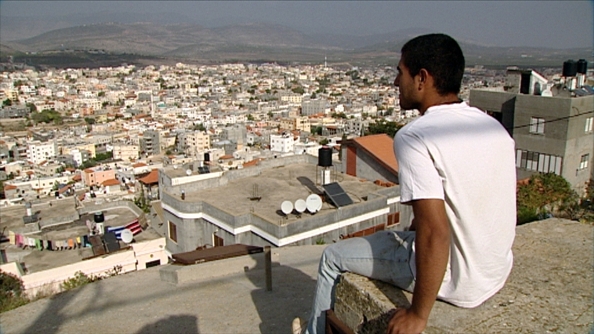He’s an 18 year old like any other – into music, hanging out with friends, thinking about girls, thinking about the future. He cares about his family, he wants to have fun; he wants to change the world. He’s just like many other guys – so familiar he might be your friend, neighbor, or brother, and yet for many of us here in Israel, he is invisible.
 Ameer Abu-Ria is an Israeli-Arab; the conflict inherent in those words reverberates throughout Naomi Levari’s documentary: Ameer Got His Gun. As an Israeli citizen, Ameer has what is known as a “blue” identity card, this means that he is a citizen like any other, with the same rights and privileges as any Israeli citizen. As a Muslim Arab, Ameer is exempt from military service on the assumption that he may pose a security threat. Yet Ameer chooses to volunteer, and Levari’s film follows Ameer and his family through the process of his enlistment and early training.
Ameer Abu-Ria is an Israeli-Arab; the conflict inherent in those words reverberates throughout Naomi Levari’s documentary: Ameer Got His Gun. As an Israeli citizen, Ameer has what is known as a “blue” identity card, this means that he is a citizen like any other, with the same rights and privileges as any Israeli citizen. As a Muslim Arab, Ameer is exempt from military service on the assumption that he may pose a security threat. Yet Ameer chooses to volunteer, and Levari’s film follows Ameer and his family through the process of his enlistment and early training.
The Hebrew title of the film is Bnei Dodim La’Neshek – cousins in arms. Although Jews and Arabs may refer to one another colloquially as ‘cousins’ one often feels that the two groups live in parallel universes, with suspicion and prejudice forming an almost impenetrable barrier to any real connection. Ameer is an ordinary 18 year old, but the circumstances of his life and the choices his must make are anything but ordinary.
Why would an Israeli Arab volunteer to serve in the military? Military service is mandatory in Israel, making it a rite of passage to Israeli culture in many respects. This is where friendships are formed as well as networking connections; many careers are launched on the basis of military experience and acquaintances. Much of Israeli slang originates in the military experience with its absurdities and acronyms. Not everyone serves, there are various exceptions and exemptions, but to a great extent military service creates a cultural bond, the difference between understanding a joke and having it patiently explained. Setting aside one’s views on the military and the Israeli-Palestinian conflict, serving in the military is still part of what it means to be Israeli.
Yet what does it mean for someone who is a Muslim Arab? With whom does he identify, Israeli or Arab? How does one begin to be both? The hyphen between Israeli and Arab is stretched to its limits. These are some of the questions explored in the film, which follows Ameer during this crucial time. Talking to his father in the car as they drive to enlist, showing off his report card to his mother in the kitchen as she makes him one of the most delicious looking salads I have ever seen on film, the viewer becomes better acquainted not only with Ameer, but with his family.
The film follows Ameer through basic training, the degree of access here is impressive and the film also provides a rare look at human relationships in the military environment, usually off limits to cameras. The film refrains from grand gestures or political slogans; it does not offer any simplistic solutions. Striking in its modesty and clarity, it allows the different voices to be heard, letting questions rise and moving the viewer to think further. Ameer Got His Gun is a sensitive and intelligent film portraying an individual as he navigates the surreal terrain of his life.
Ameer is an 18 year old like any other, and yet he is not. In scene after scene he meets the circumstances of his life with honesty, humor, hope and an emotional maturity beyond his years. His courage in allowing this film to be made takes my breath away. Becoming acquainted with Ameer through this film has already changed my world for the better.
The next screening of Ameer Got His Gun will take place on October 26, 2011 at the Herzliya Cinematheque, at 20:40, and will be followed by a discussion with the film’s director Naomi Levari. Herzliya Cinematheque, 29 Sokolov Street, Herzliya, 09-9513361.
Ameer Got His Gun (Israel 2011, 58 min, Hebrew and Arabic, English, Hebrew and Arabic subtitles)
Director: Naomi Levari; Producer: Saar Yogev; Cinematography: Yoram Millo, Yoav Kosh, Naomi Levari; Written by: Naomi Levari and Saar Yogev; Editing: Taly Halter Shenkar; Original Music: Ophir Leibovitch; Sound Recording: Yishai Ilan, Tulli Chen, Dror Manzura and Alfred Tessler; Score Design: Ronen Nagel; Source: Black Sheep Film Productions, Tel Aviv. Ameer Got His Gun premiered at the Jerusalem International Film Festival 2011, where it received a special mention.








Hi Mitch,
the official reason for their exemption is for security reasons as stated in the “LAW OF GENERAL SERVICE” from 1956.
this is the result of my long (and hopefuly deep) research.
Thank you for your comment – you raise a very pertinent element of this difficult situation. Perhaps I should have been more precise in my wording within the article: the film states that they are exempt because they might pose a security threat. I expect that there are many reasons for the exemption, but it was not my intention to make that a focus of the article, and therefore did not delve more deeply into the issue – which can certainly be discussed at length. For the purpose of discussing the film I wished merely to establish the fact that there is an exemption.
You made a mistake, Arabs are exempt from army because they shouldn’t have to fight their own
Comments are closed.